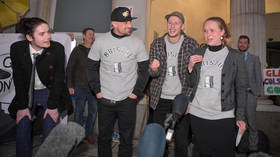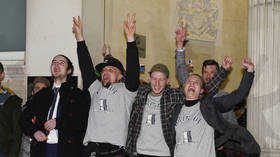The ‘Colston Four’ verdict is a licence for woke vandalism

Find a statue offensive? Upset by a street name? Object to a commemorative plaque? Don’t suffer in silence. Tear it down! It’s not criminal damage if you are acting to prevent offence.
Being convinced you are on the “right side of history” is a green light for vandalism, at least that seems to be the message sent by the ‘not guilty’ verdict handed down to the so-called ‘Colston Four’ in Bristol yesterday.
Back in June 2020, in the midst of the Black Lives Matter protests that swept the globe following the killing of George Floyd, crowds in Bristol gathered around the 125-year-old statue of slave trader and philanthropist Edward Colston. A mob succeeded in toppling the statue, dragging it through the streets, and dumping it in the nearby port. Nine people were later charged with criminal damage and four – three men and one woman – chose to let the case go to court.
The toppling of Colston’s statue was filmed by media outlets and by the protesters themselves. Those causing criminal damage are clearly visible. What’s more, the four defendants openly admitted the part they played: two came prepared with rope for the specific purpose of bringing the statue down. Yet despite all the evidence against them – and their own admissions – the four were found not guilty.
I’m a big fan of juries but, in this case, they called it wrong. It is not difficult to see why they made a mistake. The court case should have focused on the simple facts of criminal damage but was, from the outset, turned into a show trial for woke values.
Star witnesses like historian and broadcaster Professor David Olusoga appeared for the defence. Olusoga graphically outlined the horrors of slavery and explained that Colston was the head of a company responsible for enslaving more Africans than any other in British history. All of this is true – but irrelevant. The facts of criminal damage should not be dependent on the morality of the target. The fact that Olusoga’s testimony was allowed to stand meant that it was not four self-confessed vandals on trial but Edward Colston, the legacy of slavery and the history of empire.
It was not just inside the court where this narrative was established. Outside, the Colston Four had the support of Banksy, the woke graffiti artist feted by those with money to splash on lavish displays of virtue. Revenue from sales of Banksy-designed T-shirts contributed to the legal defence fund. Banksy also rallied his followers to cheer on the defendants before they appeared in court each morning. The jurors could not have failed to notice that elite woke thinking had already decreed what the only morally correct outcome should be. Dissent would put you on the wrong side of history – and no one wants to be there.
Defence lawyers reinforced Olusoga’s message and argued that by toppling the statue, the accused had prevented a hate crime from being committed against the city of Bristol. There’s nothing original in this argument. Academics have long claimed that emotional harm is more damaging than physical violence. On campus, offence is to be avoided at all costs. These ideas have filtered into our legal system which prosecutes people for hate crimes and has police keep records of people who have committed non-crime hate incidents – in other words, saying or writing something deemed offensive. Deemed offensive by who? Literally anyone, that’s who.
One of the defendants described Colston’s statue as being ‘like a racist piece of graffiti which the city council had failed to remove’. When seen in this way, the Colston Four were simply doing the police’s job for them. Some in the Conservative Party have expressed outrage at yesterday’s verdict. A source close to Oliver Dowden, the Conservative Party chairman and former culture secretary, said he “thinks that people who commit criminal damage should be held to account regardless of the circumstances”. I agree. But it is Dowden’s party that set the precedent for outlawing offence.
On leaving court yesterday, the defendants enjoyed their newfound fame. Pictured in their own Banksy T-shirts, they gave statements to gathered journalists. Their names – Milo, Sage, Rhian and Jake – were read out on news bulletins with a reverence normally reserved for heroes, not self-confessed vandals.
We’ve seen this before, of course. Last year, six Extinction Rebellion protesters were cleared of charges of criminal damage after allegedly attacking Shell’s London headquarters. The Colston Four used the exact same argument that any conviction would be a disproportionate infringement of their human rights.
The four defendants declared their victory to be “for anyone who wants to be on the right side of history”. But recourse to the right side of history is really just an arrogant claim to moral superiority. Let’s imagine that the political context was reversed. What if it was fuel-price protesters standing trial for blocking motorways, or pro-Brexit campaigners charged with pulling down an EU flag, or activists demanding justice for child victims of grooming gangs? All could reasonably claim to have been offended. But it is impossible to imagine such people walking free from court, let alone to a hero’s reception.
Politicising crime sets a dangerous precedent. Taking objectivity and neutrality out of criminal proceedings undermines public trust in the judicial system. People must be judged on their actions, not on their political values or the supposed morality of their cause. Criminal damage is criminal damage. Those who do the crime, should do the time.
The statements, views and opinions expressed in this column are solely those of the author and do not necessarily represent those of RT.
















